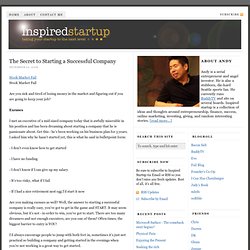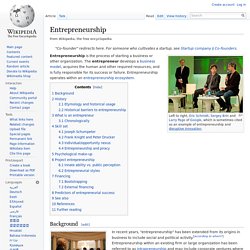

You Have to Jump First. Startups are founded by people that make the leap before anyone else.

If you don’t leap first, you don’t stand a chance of winning. Jump. It’s up to you. No one else can jump for you or before you. If you’re waiting for some form of validation from existing co-workers, family or even worse, investors, you’ll be waiting a long time. Julien Smith gets right to the point in his post about making things happen. Your Idea Sucks, Now Go Do It Anyway - Business Opportunities We. Startup Metrics for Pirates (Startonomics Hawaii Nov 2009) What drives the entrepreneur? « Entrepreneurship Talk. The Secret to Starting a Successful Company. Stock Market Fail Are you sick and tired of losing money in the market and figuring out if you are going to keep your job?

Excuses I met an executive of a mid-sized company today that is awfully miserable in his position and has been dreaming about starting a company that he is passionate about. Get this - he’s been working on his business plan for 5 years. How Google sets goals and measu. Google sets impossible bodacious goals…and then achieves them.

The engineering mindset of solving the impossible problem is part of the culture instilled in every group at Google. Tough engineering problems don’t have obvious answers. You need to invent the solution, not just optimize something that exists. Every quarter every group at Google sets goals, called OKRs, for the next 90 days. Most big companies set annual goals like improving or growing something by x%, and then measure performance once a year. OKRs are Objectives and Key Results. Failure is not an option – A while ago I wrote a post about the culture of “failure is not an option” and how, taken the wrong way, that actually conditions people to set modest achievable goals that they are certain they can achieve.
Achieving 65% of the impossible is better than 100% of the ordinary – Setting impossible goals and achieving part of them sets you on a completely different path than the safe route. Does Your SMB Do These 8 Things? I spend a lot of time talking to small business owners and startups.

I speak with them through my SEO consulting company, during phone calls about social media projects and even just while I’m on my way to and from conferences and taking the train. It’s something I enjoy doing because I like hearing their stories, their successes and the struggles that they’re facing. Often it’s nice to know you’re not the only one going through something and to have a chance to commiserate.
I work out of my apartment. I’m not exactly overflowing with social interaction these days. Through talking with people, I’ve found there are often common factors in the startups and businesses t hat do well compared to those that struggle. Think NicheDon’t set out trying to solve every problem that your industry has ever experienced. Entrepreneurial mindset. Entrepreneurship is the process of starting a business or other organization.

The entrepreneur develops a business model, acquires the human and other required resources, and is fully responsible for its success or failure. Entrepreneurship operates within an entrepreneurship ecosystem. Background[edit] In 2012, Ambassador-at-Large for Global Women's Issues Melanne Verveer greeted participants in an African Women's Entrepreneurship Program at the State Department in Washington, D.C. In recent years, "entrepreneurship" has been extended from its origins in business to include social and political activity. According to Paul Reynolds, founder of the Global Entrepreneurship Monitor, "by the time they reach their retirement years, half of all working men in the United States probably have a period of self-employment of one or more years; one in four may have engaged in self-employment for six or more years. History[edit] Etymology and historical usage[edit] What is an entrepreneur[edit]
The Yo-Yo Life of a Tech Entrepreneur. This is a guest post by Mark Suster, a 2x entrepreneur who has gone to the Dark Side of VC. He started his first company in 1999 and was headquartered in London, leaving in 2005 and selling to a publicly traded French services company. He founded his second company in Palo Alto in 2005 and sold this company to Salesforce.com, becoming VP Product Management. He joined GRP Partners in 2007 as a General Partner focusing on early-stage technology companies. TechCrunch Europe ran an article in November of last year that European startups need to work as hard as those in Silicon Valley and I echoed the sentiment in my post about the need for entrepreneurs to be maniacal about their businesses if one wants to work in the hyper competitive tech world.
Intellectual Property Watch » Blog Archive » Study Of Public Domain, Copyright At WIPO Offers Recommendations. A better definition of the public domain is needed, but copyright and public domain are not antagonistic, said a study commissioned by the World Intellectual Property Organization presented this week.

Also this week, a book on the role of copyright in access to knowledge in Africa was launched. The study was presented in a side event to the WIPO Committee on Development and Intellectual Property (CDIP), which monitors the implementation of the 45 recommendations of the WIPO Development Agenda and is meeting from 22 to 26 November. Among those recommendations, some are specifically targeted towards the preservation of the public domain.